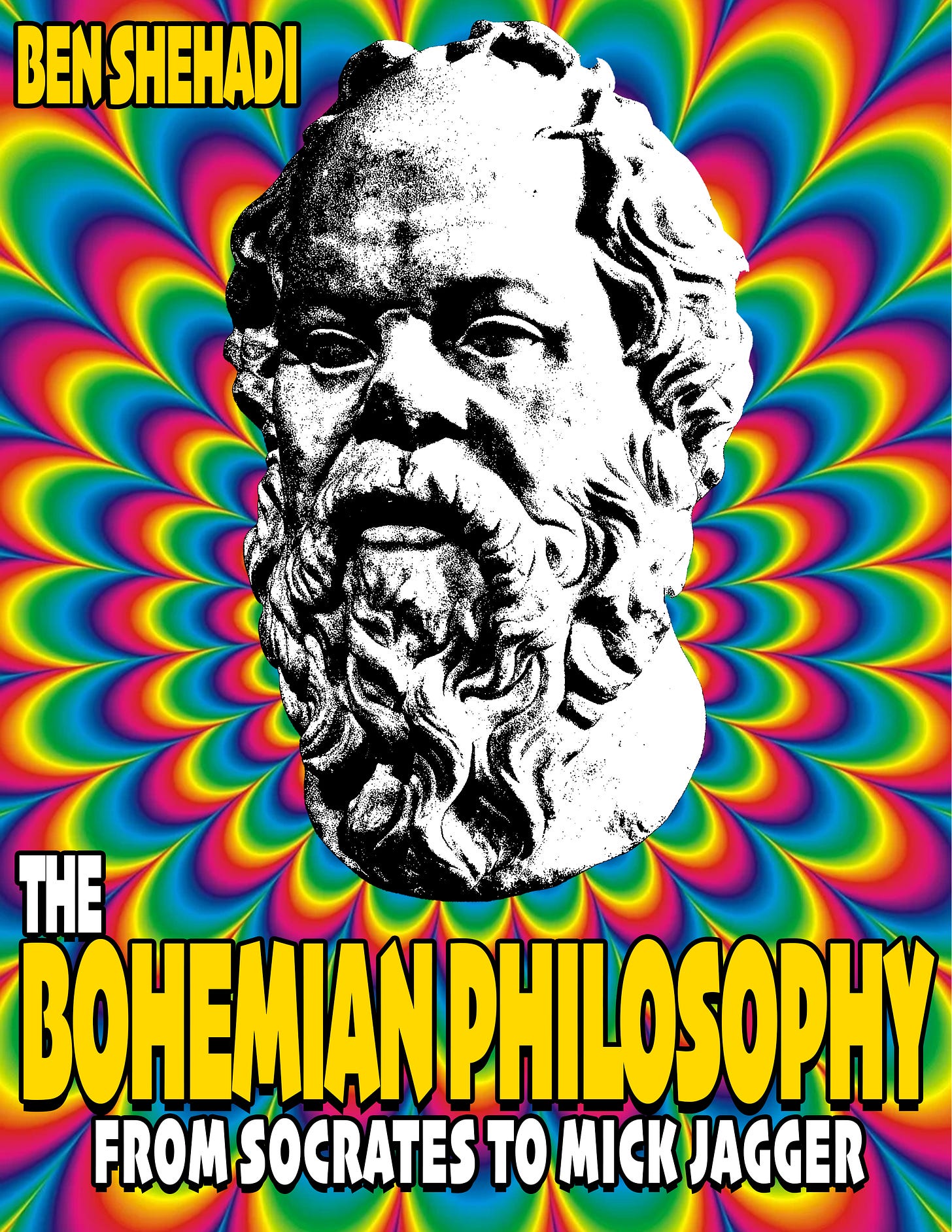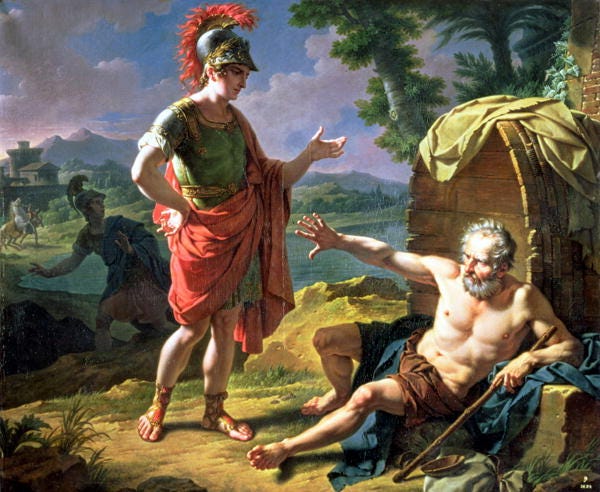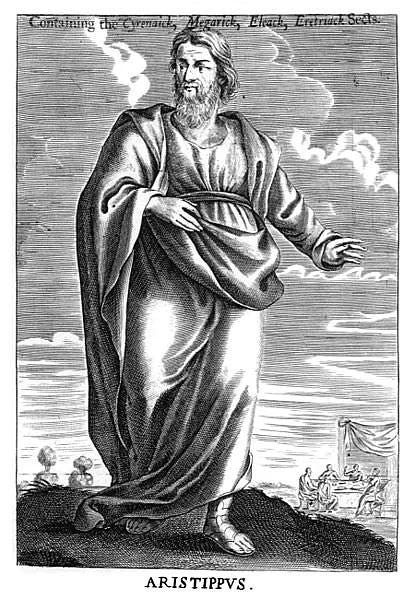
Dear Classical Wisdom Reader,
“Surrounded by losers, misfits, and boozers…”
A few weeks back, I started the Apple TV series Slow Horses and heard these words blasting out from its theme tune: a new (ish) song by Rolling Stones frontman Mick Jagger.
I’d assumed he’d largely retired recording new material and was content to live on as a symbol of the 60s. After all, when an artist is so clearly associated with one period of time, it can be difficult for them to break free of that link.
Inspired by the spy novels the series is based on, he created a song that distinctly captures that world. Now a younger audience may not think of him as the singer of Paint it Black or Gimme Shelter, they may now simply think of him as the Slow Horses guy!
Time is funny that way: what seems so distinctive of one specific era can blur easily into the next. And it works the other way too. Movements and moments that seem ground breaking often have their precursors in the past.
And while Mick’s vocals may be distinctive a marker of the swinging 60s, so too did that era have its own forebears. Not least in ancient Greece.
So today we’re looking at some of the key philosophical movements from the ancients which helped inspired the social and political movements of the 1960s.
They’re a colourful bunch, and while ‘losers’ is definitely unwarranted, ‘misfits and boozers’ is perhaps not entirely inaccurate!
All the best,
Sean Kelly
Managing Editor
Classical Wisdom
Become a Member! Support the Classics and gain FULL ACCESS to our resources, including exclusive podcasts, in-depth articles, and our library of e-books.
The Bohemian Philosophy: From Socrates to Mick Jagger
by Ben Shehadi
Mick Jagger, George Carlin, Hugh Hefner, the Beatles—what do these figures all have in common? They are countercultural or “hippie” figures... with ancient roots.
From the days of Socrates to now, there have always been freethinkers who challenged the religious, political, and social establishment. Many Greek philosophers, like the hippies, were eccentrics who were not afraid of being different: thinking outside the box, questioning dogma and authority, and exposing the hypocrisy of society.
Here are some schools of Greek philosophy that helped inspire the hippie ethos:
The Cynics
Diogenes of Sinope (412-323 BC) was the philosopher who founded Cynicism, and could be considered the world’s first hippie. The name Cynic comes from the Greek meaning “dog,” because of their dog-like apathy toward social norms. Rejecting the hypocrisy of society, Diogenes taught a lifestyle of simple living and accordance with nature.
Diogenes was famously a non-conformist. Living as a homeless vagrant, he openly defied all forms of social convention. He refused to blindly follow society’s standards of speech and dress, because natural living—rather than artificial rules—served as his ethical standard. Legend holds that, when Alexander the Great offered him anything in the world, Diogenes flippantly asked the king to move out of his way (or “get out of my sunlight,”). The Cynics cared little about so-called “great men” or the applause of others, and neither did the hippies.
Most importantly, Diogenes was the first to articulate a belief in cosmopolitanism. He was the first self-proclaimed “citizen of the world.” Like Diogenes, youth activists of the 1960s and 1970s saw themselves as members of a global human community.
Epicureans
Epicurus (341-270 BC) was a Hellenistic Greek philosopher, who taught that the goal of life was happiness. He defined this in two ways: peace of mind (ataraxia) and freedom from bodily pain (aponia).
Rejecting crass materialism and worldly ambition, Epicurus and his followers withdrew from society, and even formed their own commune: the famous “Garden” of Epicurus. Unusual for the ancients, the school was fully open to women and slaves. The hippies, too, emphasized equality for women and minorities. Like Epicurus, they also saw forgiveness as an important virtue.
Epicureanism was a highly countercultural movement in the Roman Empire. The enemies of Epicurus accused him of effeminacy, which was considered an insult in the eyes of Rome’s macho culture. In Rome’s mainstream society, men were expected to be warlike, aggressive, and athletic. But Epicurus cared little about politics or the outside world. Instead, he promised something much better to his followers: otium (“leisure”). Epicurus encouraged people to avoid ambition and prefer a life of humble obscurity.
You could say the Epicurean lifestyle is that of a “California bum,” a carefree existence without the worldly burdens of marriage, finances, and politics. The Epicureans were thus the world’s first “slackers,” the 1990s version of the original hippies. The Big Lebowski, a 1998 comedy film, inspired the post-hippie ‘Dudeist’ philosophy, which explicitly cites Epicurus as an influence.
The Cyrenaics
The Cyrenaic were founded by an obscure disciple of Socrates named Aristippus (435-356 BC). Named after Cyrene, in today’s Libya, these Greek philosophers taught that sensual pleasure was the greatest goal of life. This hedonistic ethos is expressed by countless countercultural slogans, such as “sex, drugs, and rock n roll,” “tune in and drop out,” and “whatever turns you on.”
Little is known about Aristippus or his followers, as they did not leave behind any core texts. The little we do know survives from Diogenes Laertius, an ancient biographer who lived over 600 years later. Based on our limited sources, we gather that the Cyrenaics were early bohemians who practiced polyamory and spurned wealth.
Aristippus was the first Greek philosopher to openly defend the sexual practice of free love. In The Lives of the Eminent Philosophers, he gives a hilarious answer to those who criticized his non-monogamy. “Does it make any difference whether one takes a house in which many others have lived before, or one where no one has ever lived?” He sneers rhetorically. This is the ancient Greek equivalent of The Who singing “I don’t mind other guys dancing with my girl.”
Aristippus also seems to have felt a disdain for materialism, instead preferring sensual pleasure above all else. “It is not that I am fond of pleasure,” he insisted against his critics, “but that you are fond of money.”
The Sophists
The sophists, much like the hippies, questioned the existing laws and customs of their era. They essentially taught that there were no universal or absolute truths. Rules were socially constructed - everything was, in their view, nomos (“custom”).
Instead, these ancient teachers attempted to historicize knowledge and personal ethics, which undermined Athens’ traditional religious values.
One of Plato’s interlocutors in the Republic, named Thrasymachus, gives a cynical definition of justice as “what is advantageous for the stronger.” This is echoed in the view of the hippies that laws and governments were tools of exploitation by one class against another.
Countercultural figures were highly attuned to social inequality, and they vocally denounced what they called “the establishment” for being exploitative, hypocritical, and dishonest. “The Man,” as it was called, included anybody in a position of power and influence—be it banks, corporations, politicians, teachers, lawyers, or military leaders.
The most influential social movements of the 1960s and 1970s all emerged from an attitude of skepticism and anti-authoritarianism. As non-conformists, the hippies represent only the latest incarnation of the Western bohemian tradition, which grew out of classical Athens itself.
When the Beatles travelled to India in 1968, it was not the first time a Westerner had fallen in love with Eastern philosophy. Thousands of years before, when Alexander the Great conquered India, it began a fruitful exchange between Buddhism and Western culture. Just like the classical Greeks, the hippies were influenced by Eastern ideals about reincarnation, the cycle of life, and the need for spiritual liberation.
Our modern hippies were committed to authenticity of thought and expression—whether that be the rock n roll concerts of Jagger, or the biting satire of Carlin. Yet long before the Beatles or the Stones, we already had the likes of Diogenes, Epicurus, and Aristippus preaching the virtues of universal brotherhood, freedom of expression, and independent thought.
Más info en https://ift.tt/zUHRQvF / Tfno. & WA 607725547 Centro MENADEL (Frasco Martín) Psicología Clínica y Tradicional en Mijas. #Menadel #Psicología #Clínica #Tradicional #MijasPueblo
*No suscribimos necesariamente las opiniones o artículos aquí compartidos. No todo es lo que parece.



No hay comentarios:
Publicar un comentario